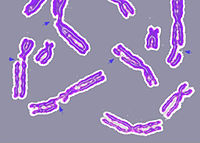
Photo from wikipedia
The C-terminal binding proteins (CtBPs), CtBP1 and CtBP2, are transcriptional co-repressor that interacts with multiple transcriptional factors to modulate the stability of chromatin. CtBP proteins were identified with overexpression in… Click to show full abstract
The C-terminal binding proteins (CtBPs), CtBP1 and CtBP2, are transcriptional co-repressor that interacts with multiple transcriptional factors to modulate the stability of chromatin. CtBP proteins were identified with overexpression in the high-grade serous ovarian carcinoma (HGSOC). However, little is known about CtBP proteins’ regulatory roles in genomic stability and DNA repair in HGSOC. In this study, we combined whole-transcriptome analysis with multiple research methods to investigate the role of CtBP1/2 in genomic stability. Several key functional pathways were significantly enriched through whole transcription profile analysis of CtBP1/2 knockdown SKOV3 cells, including DNA damage repair, apoptosis, and cell cycle. CtBP1/2 knockdown induced cancer cell apoptosis, increased genetic instability, and enhanced the sensitivity to DNA damage agents, such as γ-irradiation and chemotherapy drug (Carboplatin and etoposide). The results of DNA fiber assay revealed that CtBP1/2 contribute differentially to the integrity of DNA replication track and stability of DNA replication recovery. CtBP1 protects the integrity of stalled forks under metabolic stress condition during prolonged periods of replication, whereas CtBP2 acts a dominant role in stability of DNA replication recovery. Furthermore, CtBP1/2 knockdown shifted the DSBs repair pathway from homologous recombination (HR) to non-homologous end joining (NHEJ) and activated DNA-PK in SKOV3 cells. Interesting, blast through TCGA tumor cases, patients with CtBP2 genetic alternation had a significantly longer overall survival time than unaltered patients. Together, these results revealed that CtBP1/2 play a different regulatory role in genomic stability and DSBs repair pathway bias in serous ovarian cancer cells. It is possible to generate novel potential targeted therapy strategy and translational application for serous ovarian carcinoma patients with a predictable better clinical outcome.
Journal Title: Oncogenesis
Year Published: 2021
Link to full text (if available)
Share on Social Media: Sign Up to like & get
recommendations!